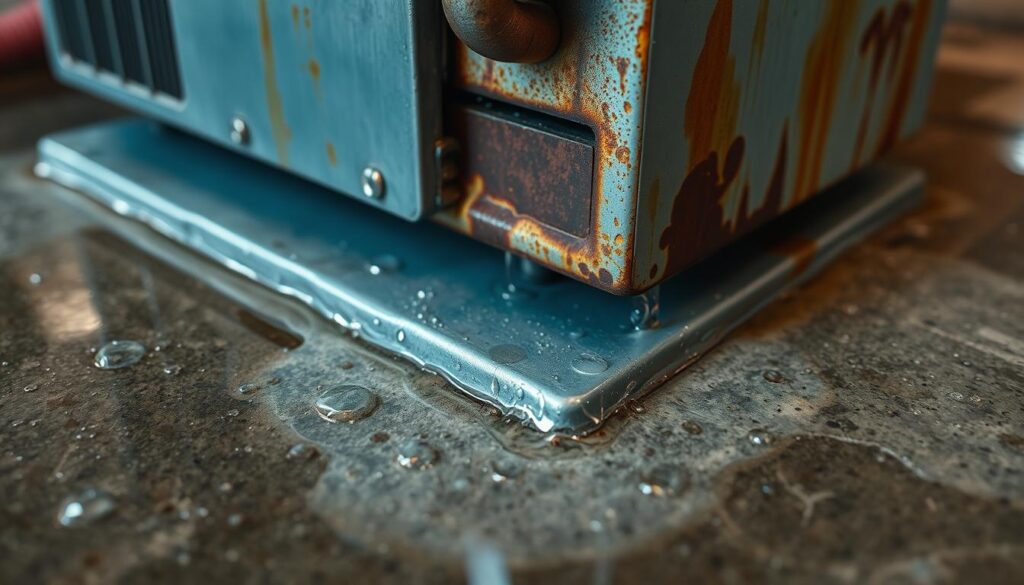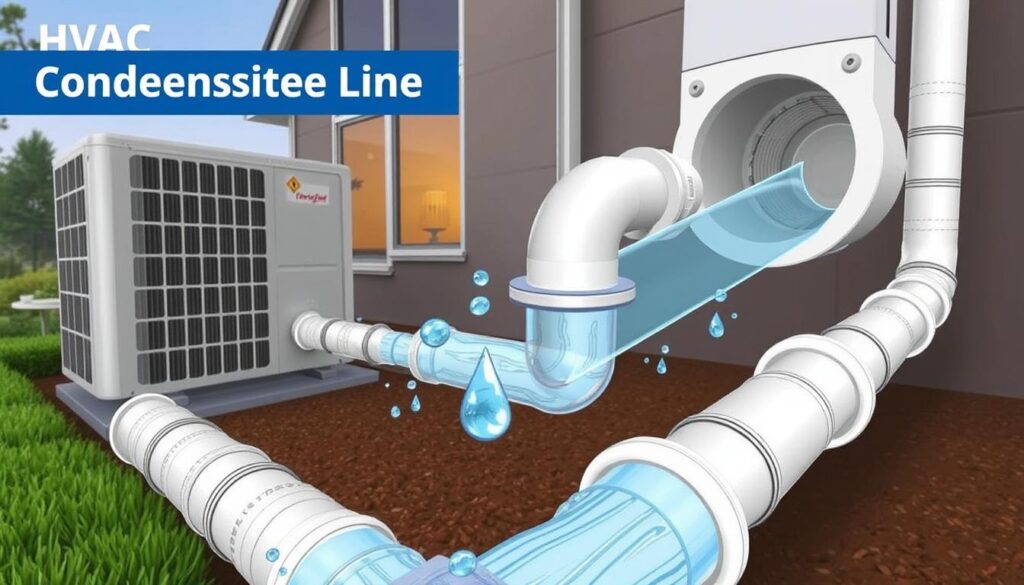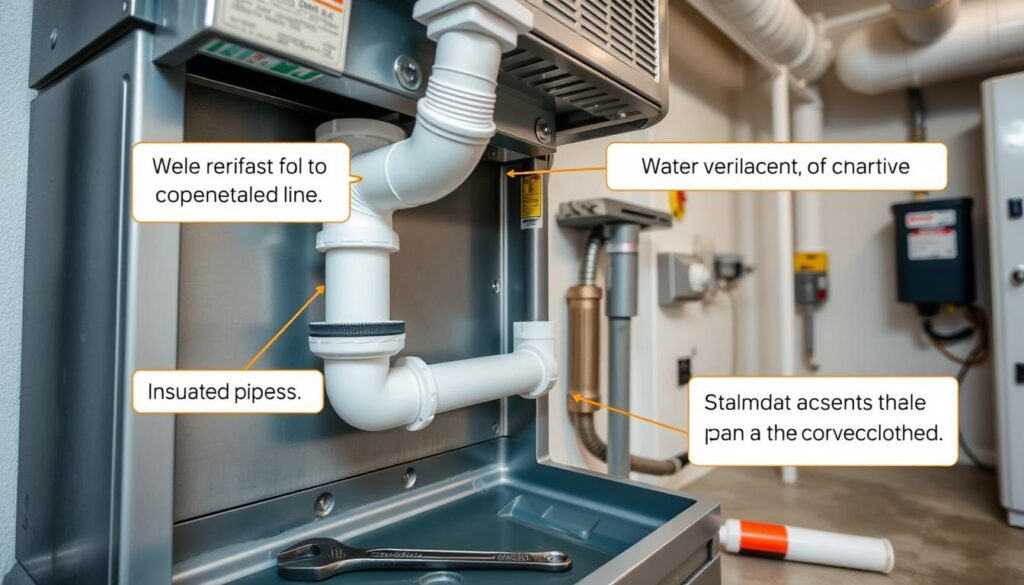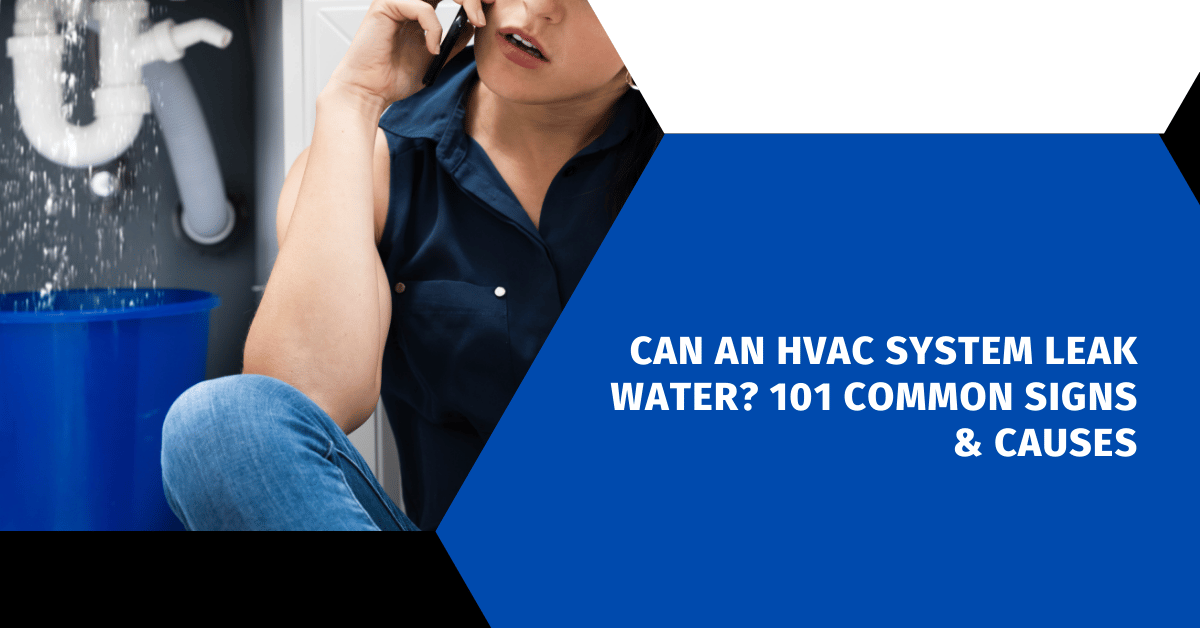Can an HVAC System Leak Water? Ever seen water dripping from your air conditioner or moisture around your HVAC system? Water is normal in cooling, but too much can cause damage and mold. So, why does this happen, and how do you spot it early?

Key Takeaways
- HVAC systems can leak water due to clogged condensate drain lines, frozen evaporator coils, low refrigerant levels, and other issues.
- Identifying the source of the leak is crucial for proper maintenance and repair.
- Addressing HVAC leaks promptly is important to prevent water damage and mold growth.
- Regular HVAC maintenance, including air filter changes and condensate drain line cleaning, can help prevent water leaks.
- Calling a professional HVAC technician is often necessary for complex issues or to ensure the problem is properly resolved.
Table of Contents
Understanding How Water Forms in HVAC Systems
Water forms naturally in HVAC systems during cooling. This water, called HVAC condensation, is usually handled well by the system. But knowing why water forms is key to fixing leaks or problems.
The Condensation Process
When warm air hits the evaporator coil, which is cooler, moisture in the air turns into water. This water then goes into a drain pan and out of the system through a condensate drain system.
Normal Water Production vs. Problematic Leaks
Water from cooling is normal in HVAC systems. It’s usually managed well by the system’s parts. But, if these parts fail or get blocked, leaks can happen.
Components Involved in Water Management
The evaporator coil, condensate pan, drain line, and sometimes a condensate pump manage water. They work together to move water out of the system.
Knowing how condensation works and the role of these parts helps fix water leaks. Homeowners and HVAC experts can tackle these issues better.
Explore Our HVAC Shop
Looking for top-rated HVAC tools, parts, and accessories? Visit our shop and find the perfect solution for your needs.
Visit the ShopCan an HVAC System Leak Water?
Yes, HVAC systems can leak water. Some condensation is normal, but too much is a problem. It can cause water damage, lower system efficiency, and even mold growth if not fixed.
HVAC systems, especially air conditioners, make condensation as they cool. Units that aren’t well-maintained often leak more water. An air conditioner can make 20 to 50 gallons of water a day, with more efficient ones making more.
Leaks can happen for a few reasons. Clogged drain lines and corroded pans are common causes. Regular maintenance, done twice a year, can stop water damage by clearing these clogs.
| Component | Lifespan | Cost | Corrosion Resistance |
|---|---|---|---|
| Galvanized Steel Drain Pan | ~20 years | Lower | Moderate |
| Stainless Steel Drain Pan | ~25 years | Higher | High |
| Polymer Drain Pan | Varies | Lower | High |
Adding a float switch to the drain pan can stop overflow. It’s especially useful for high-efficiency systems that make a lot of condensation.
Other reasons for leaks include frozen evaporator coils and broken condensate pumps. These can cause water to leak if not fixed.
Regular maintenance, like changing air filters and getting professional service, can stop AC leaks. It keeps your HVAC system working well and efficiently.
Common Signs of HVAC Water Leaks
Spotting water leaks in your HVAC system is key to avoiding big damage and expensive fixes. There are several common signs that show a problem might be coming. Knowing these signs lets you tackle the issue early and protect your home and HVAC gear.
Visual Indicators
Seeing water pooling around your HVAC unit is a clear sign of a HVAC leak. You might also spot water dripping from the system or water stains on walls, ceilings, or floors near it.
Unusual Sounds and Smells
Unusual sounds and smells can also point to a air conditioner water damage problem. Listen for gurgling or hissing sounds, which might mean a refrigerant leak or a clogged drain. Also, watch out for musty smells, which could mean mold is growing because of too much moisture.
Performance Changes
Changes in how your HVAC system works can also hint at a water issue. If it cools less well, feels too humid, or has trouble keeping a steady temperature, it might be leaking or have a moisture problem.
By keeping an eye out and fixing any HVAC leak detection issues fast, you can stop more damage. This helps keep your home’s climate control system working well for a long time.
Explore Our HVAC Shop
Looking for top-rated HVAC tools, parts, and accessories? Visit our shop and find the perfect solution for your needs.
Visit the ShopThe Role of the Condensate Drain System
Your HVAC system keeps your home’s temperature and humidity just right. But it also makes a lot of condensation. This needs to be managed to avoid water leaks and damage. The HVAC condensate line is key to this.
The condensate drain system has a drain pan and a line to carry water out. Keeping it clean, like regular AC drain pan maintenance, stops clogs and overflows. A good system removes water well and stops leaks that could harm your home or HVAC.
If the condensate drain line gets clogged or frozen, water can back up. This leads to leaks and other problems. Signs of trouble include water damage, bad smells, too much condensation, higher energy bills, poor air quality, and mold.
| Potential HVAC Condensate Drain System Issues | Consequences |
|---|---|
| Clogged Drain Lines | Water backup and leaks |
| Damaged Drain Line Components | Cracks, holes, and leaks |
| Frozen Evaporator Coils | Excess condensation and drain line overload |
| Improper Installation | Drainage issues and leaks |
It’s important to keep the HVAC condensate line and AC drain pan clean. Regular checks and cleanings stop problems. Fixing issues fast keeps your HVAC system working well and saves you from expensive water damage.

Primary Causes of HVAC Water Leaks
Even with regular maintenance, HVAC systems can sometimes leak water. Knowing why these leaks happen is key for homeowners. It helps them fix the issue quickly and avoid more damage.
Clogged Drain Lines
A clogged condensate drain line is a common cause of leaks. Dirt, algae, or debris can block these lines. This blockage stops water from draining properly, leading to leaks.
Frozen Evaporator Coils
Frozen evaporator coils are another common problem. This usually happens when there’s not enough airflow or refrigerant. It causes the coils to freeze, leading to leaks. Keeping air filters clean and refrigerant levels right is important to avoid this.
Damaged Components
Leaks can also come from damaged parts like cracked drain pans or faulty pumps. These issues let water escape, causing puddles or water damage.
Fixing the main causes of HVAC leaks is vital. Whether it’s clogged lines, frozen coils, or damaged parts, it keeps your system working well. And it stops water damage in your home.
Impact of Maintenance on Water Leaks
Regular HVAC preventative maintenance is key to stopping water leaks. It keeps your air conditioning system running well. By sticking to a maintenance plan, you can avoid expensive water damage and system failures.
Changing your air filters every month is a big help in stopping air conditioner leak prevention. Dirty filters can block airflow, causing frozen coils and leaks. Also, cleaning your drain lines often stops clogs that can lead to water spills.
- Inspect and clean evaporator coils to ensure efficient heat transfer and proper condensation drainage.
- Check refrigerant levels to maintain optimal system performance and avoid potential leaks.
- Schedule professional annual inspections to identify and address any potential issues before they escalate.
Good maintenance stops water leaks and keeps your HVAC system running smoothly. This saves energy and extends your system’s life. By being proactive, you dodge water damage and save money while staying cool.
“Regular maintenance can prevent inefficient cooling and lead to higher energy bills.”
Choosing regular HVAC preventative maintenance is a wise move. It fixes problems early, saving you money and keeping your home safe. You’ll enjoy a reliable, leak-free air conditioning system.
Explore Our HVAC Shop
Looking for top-rated HVAC tools, parts, and accessories? Visit our shop and find the perfect solution for your needs.
Visit the ShopProfessional vs. DIY Solutions for HVAC Leaks
Understanding when to call a pro and when to DIY is key for HVAC water leaks. Homeowners can handle some tasks, but complex repairs need HVAC experts.
When to Call a Professional
HVAC systems have complex parts and special tools. If you face refrigerant or electrical issues, or if DIY doesn’t work, call a pro. HVAC technicians can fix problems safely and efficiently, keeping your system running well.
Safe DIY Maintenance Tips
There are DIY tasks you can do to prevent and fix water leaks. These include:
- Regularly changing air filters to maintain proper airflow and prevent evaporator coil freezing
- Cleaning visible sections of the condensate drain line to clear any blockages
- Inspecting the drain pan and replacing it if damaged to avoid leaks
- Checking for visible leaks around the system and addressing them promptly
By doing these simple DIY tasks, you can keep your HVAC system efficient and reduce leak risks. But for complex problems, it’s best to call a professional HVAC repair service to ensure your system is safe and working right.
Preventing Future HVAC Water Leaks
Keeping your HVAC system in top shape is key to avoiding water leaks. These leaks can cause expensive damage and health risks. By taking steps to prevent leaks and maintain your air conditioner, you protect your home and ensure your cooling system works well.
Regular checks by a professional are the first step in preventing leaks. An annual tune-up with a skilled technician can spot and fix problems early. They’ll check the system, clean the coils, and make sure water drains correctly.
- Change air filters every three months to keep airflow good and prevent frozen coils.
- Clear the outdoor unit area of debris to ensure good airflow and heat release.
- Insulate refrigerant lines to cut down on condensation and leak risk.
Homeowners should watch their HVAC system closely. Listen for odd sounds, smell strange odors, or notice cooling changes. These signs can mean a problem is brewing.
Think about adding a secondary drain line or a float switch. These can help protect against water damage if the main drain gets clogged or breaks.
“Over 60,000 satisfied customers have relied on Preferred Home Services for HVAC maintenance and repair. Timely HVAC repairs are essential to prevent small issues from becoming significant problems, potentially leading to costly replacements.”
Focus on HVAC leak prevention and air conditioner maintenance tips. This will help your cooling system last longer, work better, and keep your home safe from water leaks.

Conclusion
Keeping your HVAC system in good shape is key. Knowing why and how to spot water leaks is important. Regular checks and quick fixes can stop water damage and mold.
By taking care of your HVAC, you get better air quality and avoid water problems. Simple steps like changing air filters and fixing drain lines help a lot. This keeps your home comfortable and safe.
Quick action on HVAC leaks is crucial to avoid more damage. Knowing the reasons for leaks and acting fast keeps your system efficient. Regular HVAC system care protects your investment and keeps your home comfortable.

